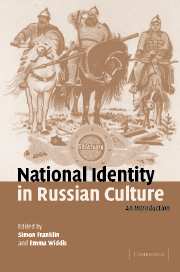Book contents
- Frontmatter
- Contents
- List of illustrations
- Notes on contributors
- Preface
- Note on the transliteration of Russian
- Map: The growth and contraction of Russia and its empire
- 1 ‘All the Russias …’?
- SECTION I IDENTITIES IN TIME AND SPACE
- SECTION II CONTRASTIVE IDENTITIES: ‘US’ AND ‘THEM’
- SECTION III ‘ESSENTIAL’ IDENTITIES
- SECTION IV SYMBOLS OF IDENTITY
- Afterword
- Notes
- Selected further reading in English
- Index
Preface
Published online by Cambridge University Press: 04 May 2010
- Frontmatter
- Contents
- List of illustrations
- Notes on contributors
- Preface
- Note on the transliteration of Russian
- Map: The growth and contraction of Russia and its empire
- 1 ‘All the Russias …’?
- SECTION I IDENTITIES IN TIME AND SPACE
- SECTION II CONTRASTIVE IDENTITIES: ‘US’ AND ‘THEM’
- SECTION III ‘ESSENTIAL’ IDENTITIES
- SECTION IV SYMBOLS OF IDENTITY
- Afterword
- Notes
- Selected further reading in English
- Index
Summary
What is Russia? What is ‘Russianness’? Who are Russians? For a thousand years these and similar questions have preoccupied Russian writers, artists, critics, musicians, film-makers, politicians and ideologists, theologians and philosophers, intellectuals and demagogues. Implicitly or explicitly, questions of national identity permeate Russian cultural self-expression, from the very first native literary and artistic endeavours of the ‘Rus’ (ancestors of Russians, Ukrainians, and Belorusians) in the eleventh and twelfth centuries, through to the intensified self-questioning in the ‘new’ Russia after the collapse of the Soviet Union in 1991. And implicitly or explicitly, the same questions permeate a great deal of writing about Russia by foreigners, whether academics or journalists or travel-diarists or intelligence analysts. What need, then, for yet another book on the subject? Why add to the cacophony of competing voices?
In the first place, there is the matter of scope and convenience. We hope that this book will be useful precisely because so much else has been written, for it is surprisingly hard to find an accessible overview, a broad and multi-faceted introductory account of this central theme in Russian cultural history. To state the obvious: Russia is a vast country with a huge population and a varied culture which has emerged and developed and changed over many hundreds of years. Few individuals can plausibly claim adequate expertise across the full range, and most studies tend understandably to reflect the particular partial interests of their authors.
- Type
- Chapter
- Information
- National Identity in Russian CultureAn Introduction, pp. xi - xiiPublisher: Cambridge University PressPrint publication year: 2004

